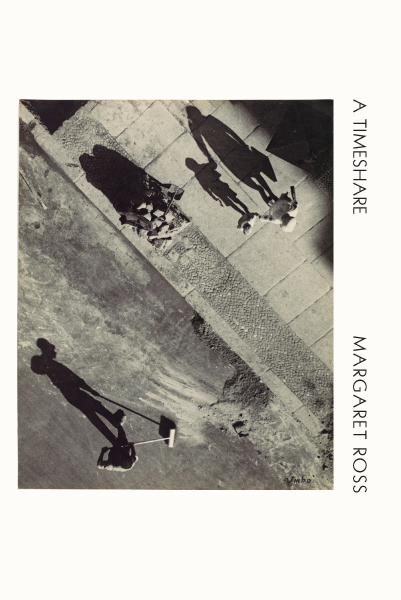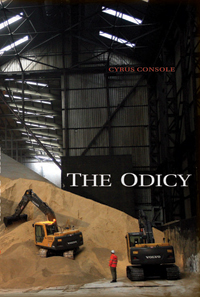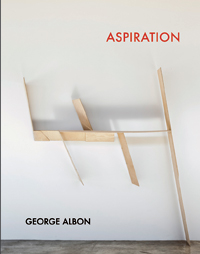Description
Winner of the Omnidawn 1st/2nd Poetry Book Prize
Selected by Timothy Donnelly
Margaret Ross’ debut unearths the corporeal in the most desolate reaches of corporate speech: Futures exchange. Human resources. Personal life. Lush and visceral, A Timeshare knows that questions and crises of individual existence are inextricably bound to shared experience and its deft music carries from the closest closet to outer space, touching the concrete through the metaphysical: it syncs the bed to the ocean, memory to zero-g, voicemail to lyric, killjar, dive bar, Lascaux, Antarctica, living and waiting rooms. What time is it? What’s time? Your shadow renders you a human sundial. “Countdown,” the book begins.
One of Lit Hub’s 30 Must-Read Poetry Debuts from 2015
Like the writings of a jumpy mystic, Margaret Ross’s fiercely intelligent and restlessly seeking poems reveal what it might be like to dwell “in an excess of mind” instead of always with the blinders on, doped down by circumstance, chemistry, habituation, or even just dumb luck. The sensitivity exhibited throughout A Timeshare is in every sense exquisite, from the Latin for to seek out, meaning not merely beautiful or precise, but also piercing, agonizing, painful, severe.
Timothy Donnelly, judge of the 2014 Omnidawn 1st/2nd Poetry Book Contest
Syntax is above all things the art and craft of time: the master syntactician can shuffle time and stutter it, slow it down and speed it, reverse it, retract it, and delay. This brilliant book introduces Margaret Ross as a syntactical artist of the highest order and degree. ‘A Timeshare’ is more than virtuosic. It surpasses the great masters of the future, and heralds the great masters of the past.
Eleanor Catton
Margaret Ross’s profound and moving collection is a wonder, a trove, a hive—it hums with the life of other species and with that of our own—“ of late” it begins, “countdown” it instructs, “ in the meantime” it says to describe the room it has in which to breathe. And yet breathe it does—as if every breath could be one of the last—though without urgency, with dignity, and an amount of imaginative compassion for that which it would capture in language which make us feel how uniquely aware this poet is of what that term gestures towards. The acutely brilliant sharp-edged skill by which to endure the act of description—and what it might bring unexpectedly into view—has rarely been as clear-headed. Short of quoting whole poems—so seamless in their formal acuity one cannot easily do so—one wants to just say: go hear this voice. It is a brand new voice. You have not heard anything like it before. It will show you ways to live in this world you have not imagined. Go willingly, as it does. Its patience is heartbreaking and its courage equally so. As for its brilliance–there seems to be no quarter where the human mind has sought to corner the real that Ross’ poems do not master and enlist in her urgent need to understand where we might stand in our mistaken special standing as a self-conscious species.
Jorie Graham
A Timeshare channels that crepuscular space between waking and dreaming. “Could you tell which was your own if you were asked to touch ten silent faces in the dark?” Margaret Ross asks in poems full of intense yet meditative wonder. They emit the ghostly ambience of “voices wafting past their sentences” and “notes across a promissory silence.” It’s as if someone was singing from the shadows, or the shadows themselves were singing throughout this stunning, truly singular debut. A Timeshare is a remarkable book.
Terrance Hayes
Like all genuine first books, A Timeshare tells the story of its own inception–the summoning of the poet to a mode of speech sufficiently capacious, strict and free to harbor emerging selves. Ross captures the moment that has captured her, overfull, contradictory, alive with memory, fact, fear, rage, history, science, commodity-desire and spirit-anxiety. Hers is a voice of brilliant capacity and vision, moving, necessary and true.
Mark Levine
In Ross’ remarkably wrought and intensely arresting first collection, A Timeshare, we finally meet a poet who knows that syntax is a Doomsday Clock. Here are poems “opening in real time,” whose hypotactic gears are turned darkly by a stunning, desolate imagination. These brilliant poems are the fine, uncanny inner workings of the soulful, moving mind of a real poet.
Robyn Schiff
About the Author
Reviews
Excerpt
Margaret Ross was born in New York City. Her work has been recognized with fellowships from the Fulbright Program, the Breadloaf Writers’ Conference and the Iowa Writers’ Workshop, where she earned an MFA in 2011. She is currently a Stegner Fellow at Stanford.
A brief interview with Margaret Ross
(conducted by Rusty Morrison)
1. The poetry editors here at Omnidawn (myself included) are the blind readers who screen for our poetry contests, and then send our selected manuscripts to the judge. We were delighted that A Timeshare was the manuscript selected by Timothy Donnelly for our First/Second Book Contest. The manuscript demonstrated fluency in current conventions of craft, yet showed, too, an infectious freshness, an alertness, a willingness to break through what is normative in poetry culture, which is one of the qualities that most excite when reading first and second books. But rarely do we find that freshness to be so fully integrated in a manuscript. Can you discuss your relationship to craft: have you been writing poems like those in A Timeshare for some time? Where did the book begin?
The poems were written between 2009 and 2014 but the way they’re written evolved from a feeling I first had in 1996, watching a video called Powers of Ten. The camera starts on a pair of actors by a lake and then zooms out by a power of ten every ten seconds. A meter, ten meter, a hundred, etc., the ground becomes the planet, the solar system, galaxy, until the screen’s at the scale of the observable universe. Then it zooms in and moves by a power of negative ten into one actor’s hand, recognizable tissue down to quarks in a single atom’s proton. The whole thing takes less than ten minutes. I was ten and watching, I felt something like what Bishop describes in the waiting room, realizing for the first time “how unlikely” it is to be simultaneously floating and stuck, that experience should be at once vertiginous and claustrophobic. Of course it’s something you keep on realizing as your relationship to space keeps changing. Not necessarily outer, but inner space, too, and places, rooms, durations. The video moved along a vertical axis but the way it construed a person as participant in multiple scales is as true along the horizontal, the temporal. This shifting sense of what scale you’re living at—you’re deep inside yourself one moment, then close to somebody else, then to multiple others, to a memory, a history, an object, objects, an economy, a different person, a system, a power structure, an environment. And the question of what feels proportionate—emotionally, ethically, actually—gets constantly recalibrated.
When I started to write I wanted to write towards that question. Every poem in the book is attached to a particular scene from which the feeling comes, but reckoning with the feeling involves moving outwards or inwards, backwards or forwards in time, so there are other images and voices, other floors, and all of them sharing in the space of the poem as they’re coterminous in the space outside it. Or that was the ambition. What excited me were these unlikely likenesses, these points of contact between apparently distant scales. Everything more implicated than it is alone. Reality feels plotless but not patternless, and poetry seems to me the most accurate means of perceiving those patterns in their true range and simultaneity.
2. I’d like to talk about the seriousness of so much of the subject matter in this text. The assertions made by this lyric subject are by turns examined and subverted in writing that reflects both personal and social critique. Though I experience great equipoise in the technical prowess of the work, there is an equal sense of impending threat in the subject matter. That convergence of subject matter and form produces a writing that I can’t put down. Rare to call a poetry book a “page turner” but A Timeshare is that for me. Could you talk about the marriage of subject matter to form, and the choices you made regarding the vaulting range of subjects that constellate into the matter in this text? If it’s appropriate, you might talk about the title of the manuscript in answering this question.
I think form is a kind of realism. The pressures its shape exerts in a poem are mimetic of the sorts of pressures exerted in life by other formal structures—days, years, lifespan. Shared forms we inhabit whether we want to or not, and each a share of something larger.
Writing, I was interested in the regular stanza as a mimesis of clock time: this system of uniform containers which holds the trivial alongside the serious. The equipoise you mention feels like part of the threat—that eerie mathematical equivalence of the hour in which something terrible happens and the hour in which nothing does. I know stanza means ‘room’ but I often think of it as ‘minute.’ Regular stanzas can represent the temporal measures to which everyone’s subject. Then, the sentences counterpoint the stanza’s cold absolute with a warm measure determined by breath and feeling and thought. There’s a lot of enjambment—in an earlier draft of the book, not a single line was endstopped—and the tension between stanza and sentence to my mind reflects similar tensions in lived experience. I can’t choose how many hours I have, but I can try to choose how I fill them.
That fundamental conflict inscribed in the form is the common threat propelling the subject matter. So the poems are about choice and stricture in daily life, and the way the limits and extent of each shapes relationships, to individuals as well as to collective bodies. The vaulting comes, I think, from wanting to depict real time, which can feel sinisterly intricate. It gets back to the multiple scales in the question above—where to live from. What to see. How to proceed from there.
3. I’d love it if you would choose a poem or two that have particularly powerful significance for you and talk about the work. What experience or convergence of experiences initiated the work? What did the writing of the poem demand of you? Change in you? Are there poems in the book that surprised you? Frightened you? “Devil’s Optics” is a poem I’m curious about, and interested in, since its tone is playful as it begins, its proposed subject seemingly so simple, its repeating language almost childlike, nursery-rhyme like, and yet its movements, the assumptions it describes only to disrupt, eddy from the language on the page like ripples from a stone dropped in a deep pool.
Yes, “Devil’s Optics” did begin thinking of nursery rhymes, also nonsense verse, both of which I love for their music and for how good they feel to say and for the way they know repetition is double-edged, as familiarizing as it is estranging. You repeat something and you hear it more carefully, but it doesn’t take too many more repetitions before the definition drains out of the words and the sounds sound senseless. So this process of listening more carefully and getting to know something is also a process of unknowing it or, perhaps, getting to know the unknown in it. It’s something that preoccupies me, since my life as I experience it seems to be made up of repetitions, voluntary and involuntary, trivial and not. Does it get more familiar or more strange? A lot of the other poems play with these sorts of lived repetitions, “Personal Life,” “Age Control Concentrate,” “Dissolution,” “Human Resources,” “Refresh Rate.” Actually, that last poem was once one of a pair of poems that each began with the same stanza, then proceeded into difference. I was wondering what it would be to rhyme entire poems, I think, rather than just words within a poem.
4. Could you talk about any writers &/or artists &/or thinkers who have influenced you in this work? (in what direct or indirect ways have you felt this occur?)
There were some things I read over and over as I wrote. I know they influenced me, but any description of that influence sounds flimsy compared to the real effect they had. Many felt talismanic. I’d sleep with them in my bed. Beckett’s shorter plays, especially “Come and Go” and “What Where,” and this old anonymous poem, “Maiden in the Moor Lay,” for the way they find the highest stakes in the simplest repetition. Bergvall’s “Via” does this too, and Ukeles’ notion of maintenance art. Then all of Moore, especially “People’s Surroundings,” Stevens, Ponge, Graham, Sh?nagun, Hayes, Marvell, Schiff and Bishop, her letters also. Hejinian’s My Life, Woolf. These writers who love objects, not even especially interesting objects, just the ordinary things you touch and move around, overlook, but that imply everything about the life they furnish. There was long prose I was moving slowly through, figuring out what the sentence does to time—Remembrance of Things Past and David Foster Wallace’s The Pale King, which was also set in the Midwest where I was living then. That landlocked feeling. Syntax as spirit in Baldwin, James. Eisenberg stories. On Being Blue. The more I think back, the more I remember, more than I can list. I was in school for part of the time I was writing, so I had the luxury of endless libraries. I kept out Dickinson’s letters and Yi-fu Tuan’s Space and Place long overdue. I’d never read about painting before and started to, to learn about simultaneity. I kept renewing The Sight of Death by T. J. Clark and Didi-Huberman’s Fra Angelico.
5. Would you tell me a bit about yourself? Anything you are willing to share that might not be in your short bio that is published in the book?
I could talk a bit about what I’m working on now—I just got back from living in Nanjing for a year where I was working with the poet Huang Fan to translate his poetry into English. We’ve continued by email and in Vermont this winter, thanks to a VSC Luce Fellowship. Huang Fan is a great poet and one I hope more English-language writers will get to read soon. He has a series titled after common objects—“Spoons,” “Red Grapes,” “The Middle-Aged Beard”—full of these totally disarming descriptions. Otherwise, I’ve been living in New Haven, teaching creative writing at Yale. The poetry class has been particularly fun as it’s for whatever reason made up almost entirely of computer science majors. They have all this knowledge of form and pattern and sequence that’s deeply applicable to poems. It’s expanded class discussions immeasurably.
6. You were instrumental in the selection of the image that is used in the cover design for this book. Would you describe your considerations in your arrival at the choice for this cover image? How does this cover align with your intentions for the book?
The image is by Umbo and is called “Mystery of the Street.” I admire its equanimity, how it accesses some strange other order within rather than at the expense of the mundane daily order of the street. So the metaphysical and the mundane are parallel, level. It reminds me of the long shadow in many of the readymade phrases I wanted to plumb in the poems—assisted living, futures exchange, timeshare. Nothing that is not there and the nothing that is.
[A Timeshare is] … full of ideas, almost giddily aloft on the swells of long sentences, and replete with carefully counterintuitive moments of beauty…
. . . in Ross’s poems the inhabited moment is mourned from an imagined future, and by the end of the book a strange feeling of looking back upon the moment of humanity from a post-anthropocene vantage starts to pervade its formal intricacies.
OF LATE
Countdown. Steady ruby pulse of the security
bulb as usual at permanent zenith to receding
chrome knobs of the multiple doors. All locks
secure. Halls clear. Walls bare between the hooks
from which starched whitecoats plunge like so
many ruined candles in a row that once could
light one’s passage in towards
innermost enclosures. Labmice there glow
green and beautiful, infected shades expressing
jellyfish genes like telegraphic fires flared
from hill to hill once meant “land
conquered, staked,” and such
slight flames prove helixes mastered.
Their slopes these days swept bright
and dull, equipped with footlights, lightning
bugs on hire connect the dot-dot-dots
that patiently await some tourist’s signature.
The lingering megawatt ellipses, what we have
for abaci, shuttle dimming thought to thought
across warped azimuths down to civil
dusk. Before the obviously chemical
blue dark, gold strands like
shrimp veins thread the human
skulls of girls. Lawns drenched in iodine.
All along the river flickering pills
if they would just align
could be taken to mean Tear Here.




